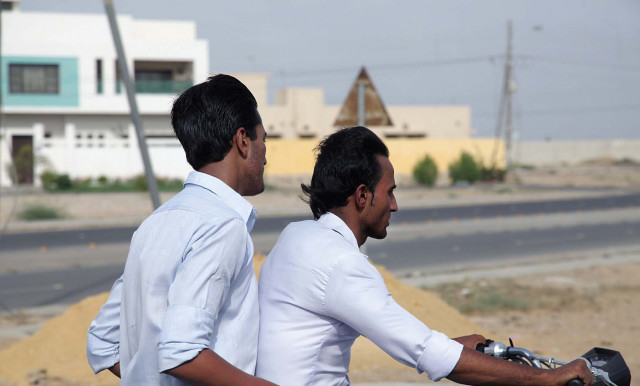Two is not a crowd: Pillion riding back in, firecrackers out
Govt bars firecrackers but is allowing double sawari once again.

The government has decreed firecrackers to be more dangerous than three people squeezed on a motorcycle.
On Friday, the new home minister, Manzoor Wasan removed the ban on pillion riding but decided to forbid the sale and purchase of firecrackers at a meeting held at his office to discuss the law and order situation in the province, Karachi in particular. Additional interior chief secretary Waseem Ahmed, adviser Sharfuddin Memon, Inspector General Police (IGP) Wajid Durrani and other officials attended.
The ban on pillion riding, or double sawari, was imposed on July 6 when Karachi was hit with a four-day spate of violence. After 30 people died on the second day — the majority shot dead by mysterious men on motorcycles in Orangi - the government decided it was safer to limit the number of riders to one per motorcycle. However, the ban did not prevent the death toll from crossing the 100 figure during the spate of violence and the protest against Zulfiqar Mirza’s comments against Altaf Hussain.
On Wednesday, Wasan had told the media that the government would lift the pillion riding ban if things went back to normal within a week. Sharfuddin Memon, however, was quick to take the credit for the removal and imposition of both the bans.
“It [lifting the ban] had to be made a priority because people do not want the ban on pillion riding and they had already faced prolonged bans on it in the past,” he explained to The Express Tribune.
The home minister also banned the sale and purchase of firecrackers and other materials used in firework displays. He directed all SHOs to crack down on firework sellers.
Pillion riding bans have been on more often than not since they were first imposed in November 2008 following a spate of target killings. Since then, it has been removed for brief periods on a few occasions such as Eid. However, if the ban helped reduce killings, the numbers could not prove it.
A blessing in disguise?
For the common man, the ban was “a violation of fundamental human rights”. The news of the ban being lifted was met with a wave of pleasure. Phones buzzed as text messages spread the word — people would no longer have to look to the unreliable public transport system to get to work, they could just hop on a friend’s motorcycle.
“We really didn’t think the ban would be lifted this time,” said a resident, Farhan. “I think the government and police have finally realised that the ban does not make anything better.”
Police sources claim that over 1,500 people were booked for sharing a two-wheeler during the most recent ten-day ban. Wakil Ahmed, a resident of Nazimabad, told The Express Tribune of how he ran into trouble with the police shortly after the ban was imposed. He was taken into custody along with his younger brother while they were on their way home from their shop in Saddar.
This was in the morning, even though the ban was officially meant to be implemented after 12 pm, he claimed. “The police began catching people before the ban was even introduced,” he said. “When it was lifted, they told us that it would end at midnight even though it was supposed to be removed then and there in the afternoon.”
Mohammad Saleem, meanwhile, is simply lamenting the addition to his travel expenses that came with the ban. “I travel 36 km every day, my brother and son are often with me. When the ban was imposed, they had to travel in buses, rickshaws and taxis which is very expensive.”
The experience of travelling in public transport was made all the more uncomfortable with everyone rushing to buses to get them across town. “The overcrowding would cause accidents which wasted our time all the more,” he said. “We’re already living from hand to mouth, we just hope to God that the government does not impose the ban again.”
How the court deals with violators
A few days ago, two young men were brought before a court for violating the pillion riding ban. They were granted bail, Rs5,000 each, by a judicial magistrate.
Legal expert Prof. Iqbal Shah Advocate explained where pillion riding falls within the law.
The charges in the FIRs registered for cases of pillion riding are lodged under Section 188 of the Pakistan Penal Code and judicial magistrates grant bails to the offenders under Section 497 of the Criminal Procedure Code, he told The Express Tribune.
Section 188 terms the offence punishable by up to six months in prison and a fine of Rs 1,000 maximum. Though the second refers to offenses without bail, magistrates usually grant bail while they are confirming the charges.
With additional reporting by Sohail Khattak
Published in The Express Tribune, July 16th, 2011.












1724319076-0/Untitled-design-(5)1724319076-0-208x130.webp)






COMMENTS
Comments are moderated and generally will be posted if they are on-topic and not abusive.
For more information, please see our Comments FAQ